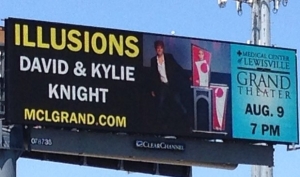I want to touch on a subject that is a blessing and a curse to anybody in the arts. I want to talk about criticism.
Constructive criticism is one of the very best gifts that we as performers can receive. We cannot move our art forward without it. However, sometimes the criticism is not constructive or we do not receive it well. Now, the key to making the most of any criticism is to:
- (a) accept it for what it is and
- (b) take it with a grain of salt.
A GOOD EXAMPLE
I am always impressed with Ian Richards – he is a member and past president of the Dallas Magic Clubs. He will often perform an effect for the club with the explicit purpose of receiving feedback on it. I have to tell you that, to me, takes a lot of guts. It is brutal watching him stand there while people pick apart some element of a routine that he has spent hours trying to master. I came to realization that he is actually rather brilliant. Ian listens to the critiques and dissects them for what is appropriate and what is way off the mark. In the process, he actually gets to find nuggets of insight that he can use in his performances.
TRYING IT OUT
 Recently, Kylie and I did a show at the MCL Grand. We did this, in part, to produce a new promotional video. I have to tell you, this was an incredibly trying experience for us. Not only were we in charge of doing the performance, we also dealt with the ticket sales, merch sales, and almost all other aspects of the evening. In hindsight, we would have changed a few things about the proceedings. Ultimately, we feel that we did an overall decent job. However, we may have stretched ourselves too thin. This led to some poor choices and missteps on our end.
Recently, Kylie and I did a show at the MCL Grand. We did this, in part, to produce a new promotional video. I have to tell you, this was an incredibly trying experience for us. Not only were we in charge of doing the performance, we also dealt with the ticket sales, merch sales, and almost all other aspects of the evening. In hindsight, we would have changed a few things about the proceedings. Ultimately, we feel that we did an overall decent job. However, we may have stretched ourselves too thin. This led to some poor choices and missteps on our end.
One of the features included in the ticketing system we chose for our show was the ability to email a survey to our attendees. This was both a very cool prospect for us and a terrible proposition. You see, we already knew some of the issues and complaints about the show – we had them as well. What we gained was the ability to hear other complaints and the general public’s real feelings about the show.
CRITICISM – WHAT DID WE LEARN?
What struck me most was the clear divide in the subject of the responses. Magicians (of which there were several at the show) had very different concerns about the production than the general public. In some instances, our brothers (and sisters) in the art brought up issues that were not even on the general public’s radar. Conversely, the general public talked about very different things than magicians did.
We did get to hear about things that people liked in our show. Things that we never would have pointed out and/or things that seemed to play better than we expected or hoped.
Ultimately, this was a very positive experience. Perhaps next time I will talk more about the things we learned in this process.